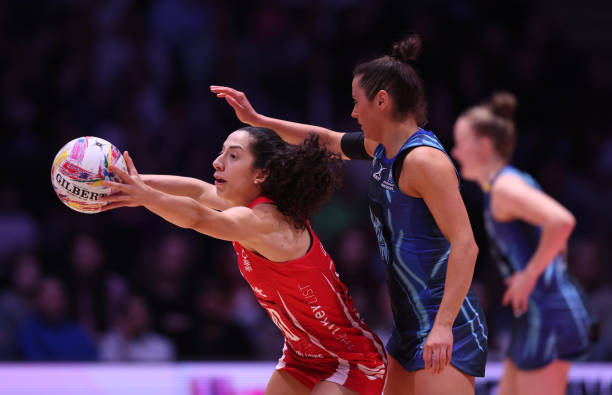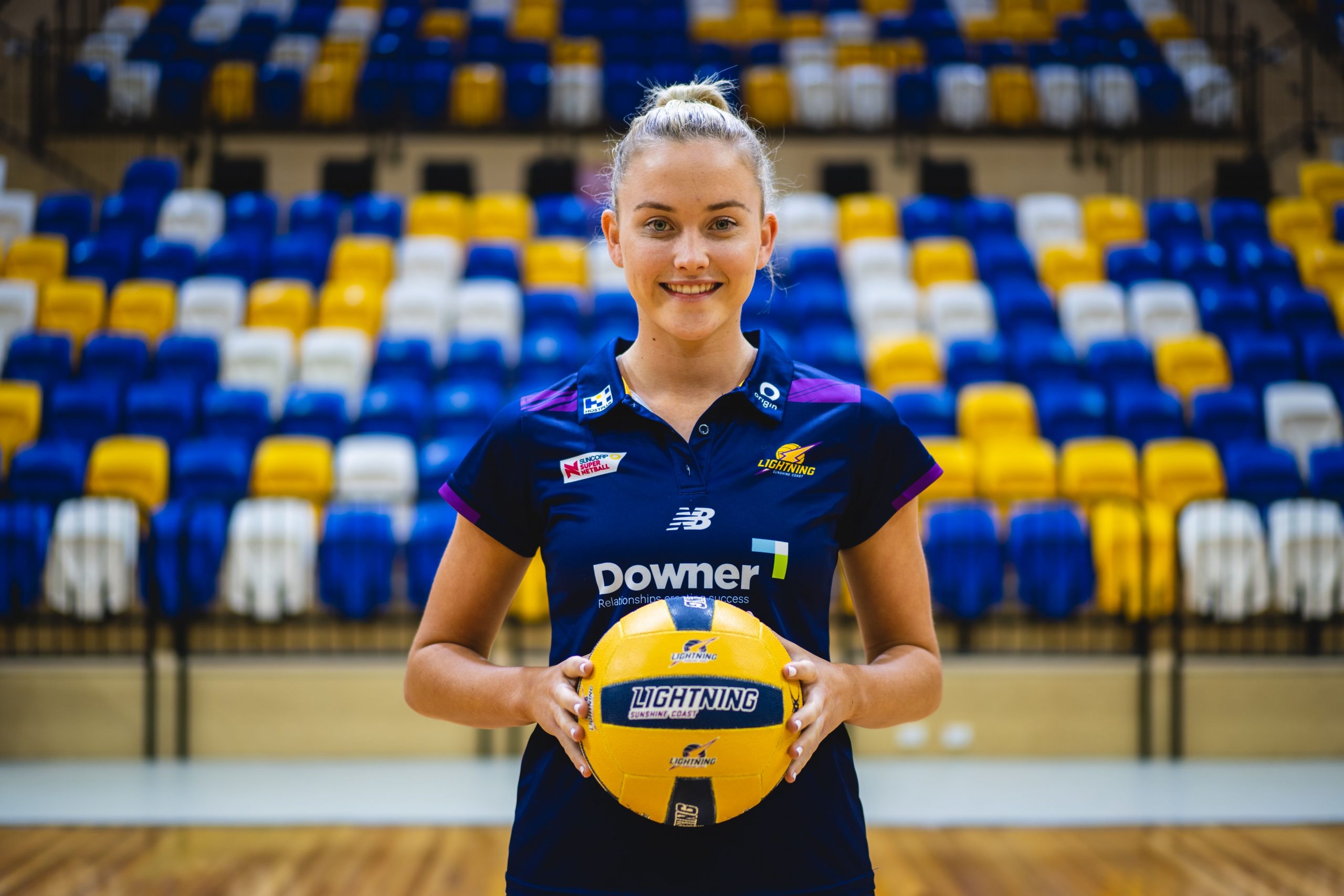Rhinos coach leading the charge for progress in the VNSL

YORKSHIRE-based Leeds Rhinos are the brand new franchise on the Vitality Netball Superleague (VNSL) block for 2021, and they are already causing a bit of a stir within the UK netball community. Their statement signing of England’s most capped player in Jade Clarke, who will be joined by up-and-coming Roses young gun Vicki Oyesola, has sparked a huge amount of interest. Superleague fans will be itching to see how these experienced players combine with the homegrown Northern talent who will form a key part of the squad. Draft Central spoke with Leeds Rhinos Head Coach Dan Ryan about the ongoing signing period, and about how the VNSL should evolve in order to professionalise the competition in the coming years.
Rhinos had the challenge of creating an entirely new roster from scratch and had to compete with all ten existing VNSL franchises to attract athletes, as well as the difficulty of signing players following an incomplete Superleague season which only lasted three rounds. From the outset, Ryan had a focus on hand-picking a sustainable squad which balanced youth and experience which has the potential to develop over the coming years.
“Building a team from the ground up with no players on our books to start with was quite a challenge,” Ryan said. “I’m really happy with the group we’ve signed as our inaugural team, and I think they will lay the foundations for what we can create now and into the future.”
The franchise targeted a lot of athletes in their early 20’s that had been exposed at Superleague level but who had not necessarily secured a starting spot, in order to give them the opportunity to develop and achieve their potential. It has recently been announced that local youngsters in Brie Grierson and Rosie Harris will be joined by Brittany Coleman, transferring from Celtic Dragons, and Rhea Dixon from Surrey Storm. As the core of the squad begins to take shape, it is clear to see the planning and attention to detail which has gone into crafting this brand new team.
“We wanted to ensure that the young, emerging talent that we have within our squad has some strong leadership and our senior players will provide that. We feel like that balance is critically important, and we want to provide a comfortable environment for the youngsters and also a challenging environment for the senior athletes as well.”
With four more squad members still to be announced, as well as five training partners, Ryan hinted that Rhinos will certainly be filling their quota of two import athletes in the side. He also mentioned some proposed changes he would like to see included in Superleague when it comes to non-EU athletes. The import rule is seen by some as restrictive and Ryan would like to see it opened up to three imports per team – one per third – as well as an extension of the countries which franchises are allowed to recruit from. Currently, only players whose countries sit within the top 12 in the world rankings are able to be snapped up to represent the Superleague franchises.
“The vision of the UK Superleague is to become one of, if not the best, leagues in the world and to do that we need to broaden our horizons in terms of which athletes we attract to our competition,” Ryan said. “If we are expanding in terms of teams, we need to expand in terms of the variety and diversity of athletes that we have within the league.”
In addition to this, Ryan would also support borrowing some innovations from SSN when it comes to extending benches to 12 and the inclusion of rolling subs. He believes these updates would strengthen the competition and the standard of the game within the UK, as well as introduce more big names and personalities into the league.
Another topic which could be seen as a barrier to progress for the competition is the salary cap. It currently sits at £70,000 (around $128,000 AUD) per team, and clubs must recruit nine of their ten players within this limit. Teams are also permitted one additional “marquee” player who sits outside this cap. However, certain other costs, including accommodation requirements, are included within this amount – which can restrict players earning capacity if teams need to also accommodate them. Ryan is calling for an improvement in terms of the threshold, and also changes on what is included within the salary cap.
“At the end of the day, we want to professionalise the league and the competition and have as many players being full-time professional netballers as possible, and at the moment we can’t do that. I understand it is in place to ensure a level playing field but I think we need to be a little bit more aggressive in terms of moving that professionalism forward and creating those full-time professional environments for the athletes.”
Ryan’s wealth of netball experience gained in Australia is a huge benefit for the Superleague as a whole, and particularly in relation to the new training programme which he has developed for Leeds Rhinos. Whilst most Superleague teams get together to train around three times per week, the Rhinos athletes will benefit from a full-time training regime which replicates what teams might do in the ANZ or SSN. The athletes will train five days a week with two rest days, which is a bigger commitment than most of them will have experienced before.
“This gives us a lot of time together as a brand new team to build our connections and combinations, but also to time to educate them all on high-performance behaviours and high-performance training environments.”
At the moment, all clubs are reintroducing their players to the court after the extended break, in line with local and national restrictions due to COVID. Once Rhinos are able to train at full intensity, a typical week will include three strength sessions in the gym and court sessions four times a week, as well as wellness activities such as pilates, yoga and mindfulness.
“The players will be getting full-time coaching both from a strength and conditioning and a technical netball coaching perspective. It’s quite an extensive programme for the athletes, but we certainly wanted to deliver a professional programme and that’s been our aim from the start.”
This type of training programme is a very attractive prospect for Superleague players, and another big positive for the club is the partnership with Leeds Rhinos Rugby, who are a well-established franchise within the Yorkshire region. The netball team is fully integrated within the club environment and benefits from access to certain facilities, as well as media, marketing and commercial components of the business.
“We’re not a sidearm of the business or a second-tier partner – We are a genuine part of the Leeds Rhinos organisation which is amazing,” Ryan said. “Coming to Leeds Rhinos for the athletes is bigger than just rocking up and playing and training in a netball capacity, we’re really proud to be a part of the club.”
Having the support of an established sporting franchise which already has a reputation within the community is hugely beneficial for the development of netball as a whole. It also adds a level of experience and insider knowledge on how to manage a professional sports club. With Ryan at the helm, the future is looking very positive for the brand new Yorkshire franchise. The Superleague needs innovation and forward-thinking leaders if it is to develop into a fully professionalised competition in the years to come.








